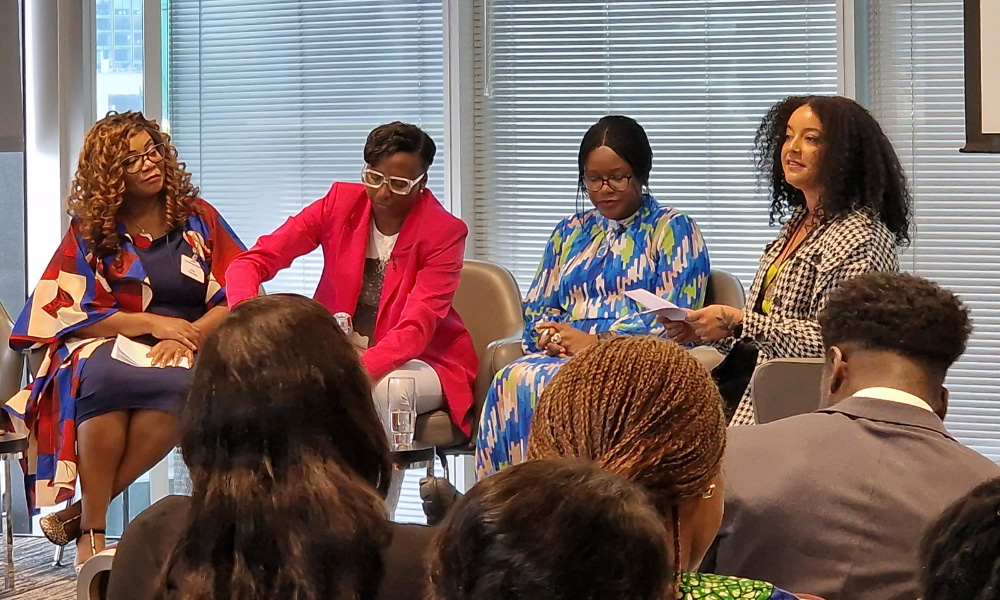This years’ Black History Month theme is ‘Saluting our sisters’, and we were delighted to host an event featuring three inspiring women leaders in equality, diversity, and inclusion (ED&I), plus an impressive panel of Local Government Chief Executives.
Here’s just some of the key learnings that were shared.
Our very own George Agyemang, Senior Consultant from the Executive Interim team kicked off the event with a personal, thought-provoking speech. He shared the important part that role models play in our daily lives and how they can help us navigate our careers: “I hope if you take anything away from this, it’s the importance of having role models in our lives, as well as the influence that we can have in the positions that we’re all lucky to enjoy.”
Next came a rousing panel discussion, hosted by our Content and Copy Writer, Camilla Alexander on the importance of empowering more Black women to take on leadership roles and the struggles they face in the workplace, as well as society.
Allyship, what it truly means and how allies can best support Black women, was a hot topic throughout the event. And Sandra Pollock OBE, an award-winning Leadership Management and D&I Consultant – among many other titles – set the record straight: “An ally is someone who chooses to support and associate themselves with an individual or group, someone who listens to and believes their lived experiences.”
Bernadette Thompson OBE – Executive Director of Equality, Diversity, and Inclusion at King’s College Hospital NHS Foundation Trust – talked about mentorship needing a refresh: “Is it just one cup of tea once a month? And what happens to that person after the mentoring session? Nothing fundamental. It needs to be about mentoring the person, planning with them, coaching them. And then when you can see they’re comfortable and competent to fulfil a role, it's about starting to mention their name in ‘rooms where it happens’.”
Four-time Olympian and Director of Equality, Diversity and Inclusion at the Professional Cricketer’s Association, Donna Fraser OBE talked about the importance of staff networks and getting buy-in from senior leaders: “They’re not a nice to have, they’re a must have and it’s supporting the business, so challenge yourselves to bring your line manager to a meeting and get them on board.”
Donna also touched on the importance of reflecting on our own motivations: “Experiencing breast cancer was a turning point for me. I was given another chance. I’m motivated by that, as well as the support I get from loved ones and mentors. And throughout my recovery I asked myself the questions – ‘What is my purpose? What is my why?’”
Many similar sentiments were shared when Dawar Hashmi, Director of Executive Search at Penna then hosted a Chief Executive question time session.
On how leaders can create sustainable change when it comes to ED&I in the workplace, Natalie Brahma-Pearl from Portsmouth City Council spoke about taking bold steps to do things differently: “I’ve seen too many ED&I strategies that sit on the shelf, like a tick-box exercise. So, we decided to take ours to the community and get their input.”
Mel Barrett of Nottingham City Council agreed: “There’s a massive difference between strategies and implementation on the ground. It’s about looking at the data, creating an action plan and ensuring delivery against that so that we can achieve diversity, which improves decision making and outcomes.”
Abi Gbago talked about the importance of mentorship and sponsorship, owing her achieving her current position as Chief Executive at the London Borough of Newham to a woman who took her under their wing seven years ago. But she also said that, above all, people feeling safe at work was key:
“I’ve never felt so exposed than I have when climbing the ladder and moving through senior positions. It’s exposing and it never feels safe. ED&I strategies don’t mean anything if the people are promoted into roles, but they don’t feel safe, and can’t be themselves.”
She doesn’t believe code switching (when people of an underrepresented group – consciously or unconsciously – adjust their language/appearance/behaviour to fit into the dominant culture) is the way: “Be yourself; because when you pretend to be somebody else, when you hide who you are – your brilliance and your shine – you start to internalise so much. It will impact on your ability to thrive in other areas of your life. It's the worst place to be.”
Jonathan Stephenson, Joint Chief Exec of both Brentwood Borough and Rochford District Councils spoke on the importance of addressing injustice to ensure the workplace is safe: “We have to call out injustice because it’s wrong. And in our roles as leaders, it’s our responsibility to make sure action is taken when grievances are filed. Fairness and respect are the basics everyone should expect at work.”
And our Managing Director Julie Towers shared a fitting quote: “Martin Luther King Jr. said- ‘people fail to get along because they fear each other. They fear each other because they don't know each other. They don't know each other because they have not communicated with each other.’ So, if there’s one job of a leader, it’s to create that communication.”
It’s safe to say we were in an echo chamber. All feeling the same frustrations and all passionate about fighting for fundamental change. So as our host Dawar put it: “Let us not forget the lessons learned from today. Let them invigorate our discussions, fuel our questions, and inspire some actionable solutions.”




